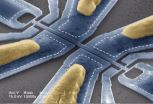MONTREAL, QC, August 27, 2012 (Press-News.org) CancerMeds Canada is an affiliate for a well-known leading global pharmacy intermediary GreatCanadianPharmacy.com. "Since 2004, our goal at GreatCanadianPharmacy.com is to provide consumers affordable Canada drugs through our unique network of licensed global pharmacies and Canadian pharmacies," explains the owner of CancerMedsCanada.com, Thomas Unger. "We aim to be one of the forerunners of premier prescription fulfillment service providers on the Web."
GreatCanadianPharmacy.com offers the cheapest and best drug prices for its consumers on the Web. It dispenses Brand and generic drugs through a vast network of licensed pharmacies and pharmacists across the globe - Canada, United Kingdom, New Zealand, Italy, India, South Africa, Israel, Switzerland, and Fiji. Prescription drugs in the United States are very costly and continue to rise at a steady rate. Many patients are not insured and many cannot afford expensive prescription drugs.
Highly priced drugs, especially cancer drugs, prevent affected consumers from purchasing and their health may slowly deteriorate and may develop other health complications.
CancerMedsCanada.com provides inexpensive prescription cancer drugs that can be beneficial to cancer patients. Purchasing drugs on CancerMedsCanada.com is very easy, reliable, and safe. GreatCanadianPharmacy.com partners up with CancerMedsCanada.com to provide a solution for consumers who are looking for affordable prescription drugs online.
Visit http://www.GreatCanadianPharmacy.com or its affiliate website http://www.CancerMedsCanada.com for more information on how to order drugs online.
Customer Support Toll Free: 1-866-799-3435 (Use Discount Code 100375)
Monday to Friday - 9:00 am to 5:00 pm (Eastern Standard Time)
CancerMedsCanada.com Partners with Great Canadian Pharmacy to Provide Cost-Effective Prescription Drugs Online
CancerMedsCanada.com provides a safe and reliable solution for ordering prescription drugs on the Web.
2012-08-27
ELSE PRESS RELEASES FROM THIS DATE:
Mayo, UCSF team discovers genomic variant that increases risk of brain tumors
2012-08-27
ROCHESTER, Minn. -- People who carry a "G" instead of an "A" at a specific spot in their genetic code have roughly a six-fold higher risk of developing certain types of brain tumors, a Mayo Clinic and University of California, San Francisco study has found. The findings, published online today in the journal Nature Genetics, could help researchers identify people at risk of developing certain subtypes of gliomas which account for about 20 percent of new brain cancers diagnosed annually in the U.S. and may lead to better surveillance, diagnosis and treatment.
Researchers ...
UCSF, Mayo team discovers genomic variant that increases risk of some brain tumors
2012-08-27
People who carry a "G" instead of an "A" at a specific spot in the sequence of their genetic code have roughly a six-fold higher risk of developing certain types of brain tumors, according to a study by researchers at the University of California, San Francisco and Mayo Clinic.
The study was jointly led by geneticists Margaret Wrensch, PhD, and John Wiencke, PhD, professors in the Department of Neurological Surgery at UCSF, and Robert Jenkins, MD, PhD, professor of Laboratory Medicine in the Department of Laboratory Medicine and Pathology and the Division of Laboratory ...
New wave of technologies possible after ground-breaking analysis tool developed
2012-08-27
A revolutionary tool created by scientists at the University of Sheffield has enabled researchers to analyse nanometer-sized devices without destroying them for the first time, opening the door to a new wave of technologies.
The nuclear magnetic resonance apparatus – developed by the University's Department of Physics and Astronomy – will allow for further developments and new applications for nanotechnology which is increasingly used in harvesting solar energy, computing, communication developments and also in the medical field.
Scientists can now analyse nanostructures ...
A lesson in sleep learning
2012-08-27
Is sleep learning possible? A new Weizmann Institute study appearing today in Nature Neuroscience has found that if certain odors are presented after tones during sleep, people will start sniffing when they hear the tones alone – even when no odor is present – both during sleep and, later, when awake. In other words, people can learn new information while they sleep, and this can unconsciously modify their waking behavior.
Sleep-learning experiments are notoriously difficult to conduct. For one thing, one must be sure that the subjects are actually asleep and stay that ...
Weighing molecules 1 at a time
2012-08-27
PASADENA, Calif.—A team led by scientists at the California Institute of Technology (Caltech) have made the first-ever mechanical device that can measure the mass of individual molecules one at a time.
This new technology, the researchers say, will eventually help doctors diagnose diseases, enable biologists to study viruses and probe the molecular machinery of cells, and even allow scientists to better measure nanoparticles and air pollution.
The team includes researchers from the Kavli Nanoscience Institute at Caltech and Commissariat à l'Energie Atomique et aux ...
Controlling gene expression: How chromatin remodelers block a histone pass
2012-08-27
KANSAS CITY, MO—Two opposing teams battle it out to regulate gene expression on the DNA playing field. One, the activators, keeps DNA open to enzymes that transcribe DNA into RNA. Their repressor opponents antagonize that effort by twisting DNA into an inaccessible coil around histone proteins, an amalgam called chromatin, effectively blocking access to DNA by enzymes that elongate an RNA strand.
Both teams maneuver by chemically modifying histones—the activators by decorating histones with acetyl groups—let's call them green flags—causing them to loosen their grip on ...
Compound discovered that boosts effect of vaccines against HIV and flu
2012-08-27
Oxford University scientists have discovered a compound that greatly boosts the effect of vaccines against viruses like flu, HIV and herpes in mice.
An 'adjuvant' is a substance added to a vaccine to enhance the immune response and offer better protection against infection.
The Oxford University team, along with Swedish and US colleagues, have shown that a type of polymer called polyethyleneimine (PEI) is a potent adjuvant for test vaccines against HIV, flu and herpes when given in mice.
The researchers were part-funded by the UK Medical Research Council and report ...
Merging the biological and the electronic
2012-08-27
Harvard scientists have, for the first, time created a type of "cyborg" tissue by embedding a three-dimensional network of functional, bio-compatible nanoscale wires into engineered human tissues.
As described in a paper published August 26 in Nature Materials, a multi-institutional research team led by Charles M. Lieber, the Mark Hyman, Jr. Professor of Chemistry at Harvard and Daniel Kohane, a Harvard Medical School professor in the Department of Anesthesia at Children's Hospital Boston developed a system for creating nanoscale "scaffolds" which could be seeded with ...
Manipulating the microbiome could help manage weight
2012-08-27
Vaccines and antibiotics may someday join caloric restriction or bariatric surgery as a way to regulate weight gain, according to a new study focused on the interactions between diet, the bacteria that live in the bowel, and the immune system.
Bacteria in the intestine play a crucial role in digestion. They provide enzymes necessary for the uptake of many nutrients, synthesize certain vitamins and boost absorption of energy from food. Fifty years ago, farmers learned that by tweaking the microbial mix in their livestock with low-dose oral antibiotics, they could accelerate ...
Scientists identify new gene that influences survival in ALS
2012-08-27
WORCESTER, MA — A team of scientists, including faculty at the University of Massachusetts Medical School (UMMS), have discovered a gene that influences survival time in amyotrophic lateral sclerosis (ALS, also known as Lou Gehrig's disease). The study, published today in Nature Medicine, describes how the loss of activity of a receptor called EphA4 substantially extends the lifespan of people with the disease. When coupled with a UMMS study published last month in Nature identifying a new ALS gene (profilin-1) that also works in conjunction with EphA4, these findings point ...
LAST 30 PRESS RELEASES:
ASU researchers to lead AAAS panel on water insecurity in the United States
ASU professor Anne Stone to present at AAAS Conference in Phoenix on ancient origins of modern disease
Proposals for exploring viruses and skin as the next experimental quantum frontiers share US$30,000 science award
ASU researchers showcase scalable tech solutions for older adults living alone with cognitive decline at AAAS 2026
Scientists identify smooth regional trends in fruit fly survival strategies
Antipathy toward snakes? Your parents likely talked you into that at an early age
Sylvester Cancer Tip Sheet for Feb. 2026
Online exposure to medical misinformation concentrated among older adults
Telehealth improves access to genetic services for adult survivors of childhood cancers
Outdated mortality benchmarks risk missing early signs of famine and delay recognizing mass starvation
Newly discovered bacterium converts carbon dioxide into chemicals using electricity
Flipping and reversing mini-proteins could improve disease treatment
Scientists reveal major hidden source of atmospheric nitrogen pollution in fragile lake basin
Biochar emerges as a powerful tool for soil carbon neutrality and climate mitigation
Tiny cell messengers show big promise for safer protein and gene delivery
AMS releases statement regarding the decision to rescind EPA’s 2009 Endangerment Finding
Parents’ alcohol and drug use influences their children’s consumption, research shows
Modular assembly of chiral nitrogen-bridged rings achieved by palladium-catalyzed diastereoselective and enantioselective cascade cyclization reactions
Promoting civic engagement
AMS Science Preview: Hurricane slowdown, school snow days
Deforestation in the Amazon raises the surface temperature by 3 °C during the dry season
Model more accurately maps the impact of frost on corn crops
How did humans develop sharp vision? Lab-grown retinas show likely answer
Sour grapes? Taste, experience of sour foods depends on individual consumer
At AAAS, professor Krystal Tsosie argues the future of science must be Indigenous-led
From the lab to the living room: Decoding Parkinson’s patients movements in the real world
Research advances in porous materials, as highlighted in the 2025 Nobel Prize in Chemistry
Sally C. Morton, executive vice president of ASU Knowledge Enterprise, presents a bold and practical framework for moving research from discovery to real-world impact
Biochemical parameters in patients with diabetic nephropathy versus individuals with diabetes alone, non-diabetic nephropathy, and healthy controls
Muscular strength and mortality in women ages 63 to 99
[Press-News.org] CancerMedsCanada.com Partners with Great Canadian Pharmacy to Provide Cost-Effective Prescription Drugs OnlineCancerMedsCanada.com provides a safe and reliable solution for ordering prescription drugs on the Web.


